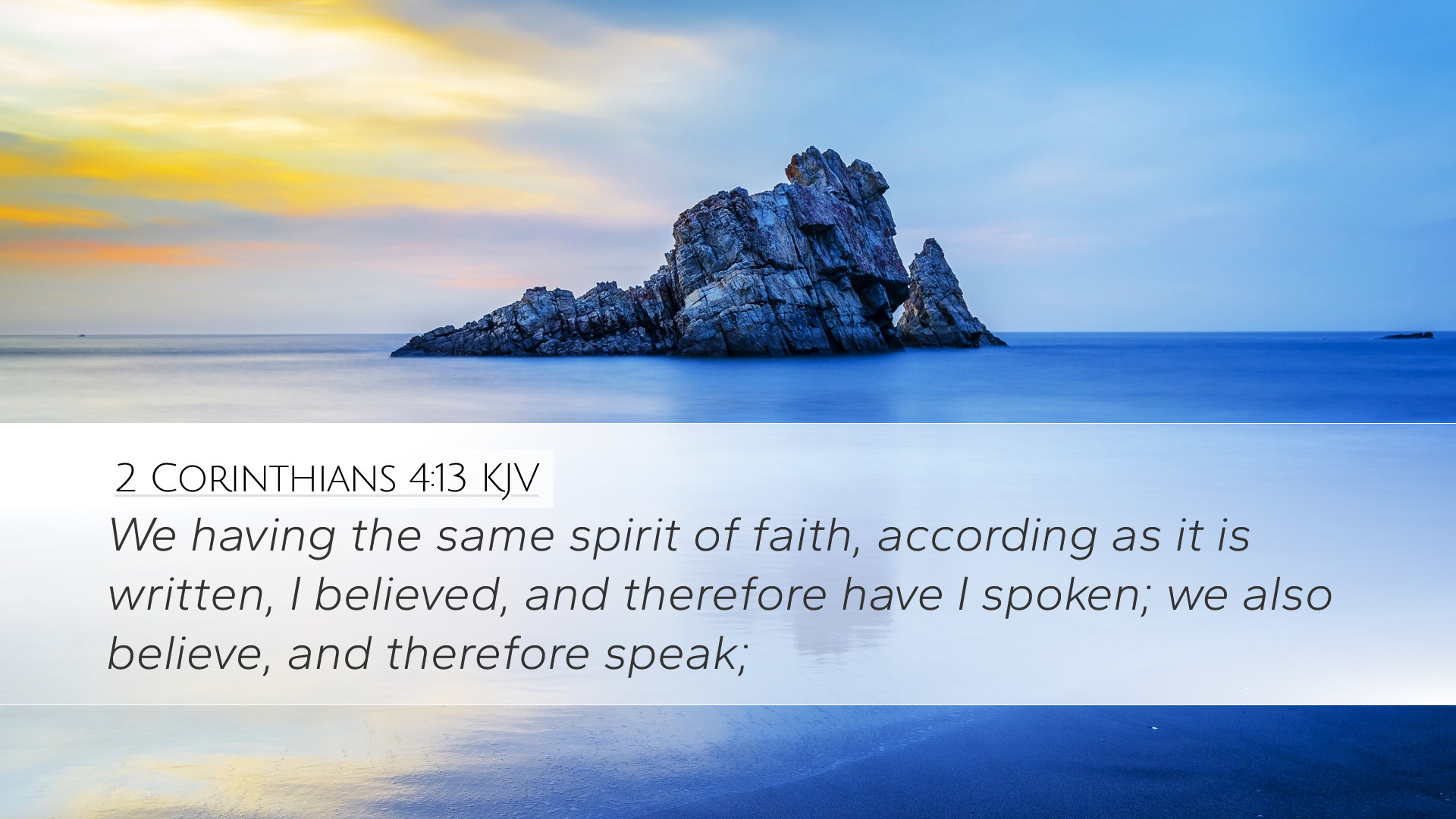Commentary on 2 Corinthians 4:13
Verse: "But having the same spirit of faith, according to what has been written, 'I believed, and therefore I spoke,' we also believe and therefore speak."
This verse captures the essence of faith in action, rooted deeply in the experience of the Apostle Paul and connected to the words of the Psalmist. The context of this verse is crucial for understanding the apostolic ministry and its implications for believers today.
Contextual Background
In the letter to the Corinthians, Paul addresses the suffering endured by apostles and believers in the face of persecution and hardships. His declaration in chapter 4 articulates a triumphant faith that acknowledges struggle but remains steadfast in belief. The reference to the Psalmist (Psalm 116:10) signifies that the act of speaking out in faith is a natural response to the belief within the heart.
The Spirit of Faith
Matthew Henry's Commentary: Henry emphasizes the concept of the "spirit of faith" as a transformative power in believers' lives. This spirit leads to conviction and the willingness to declare one's faith publicly. For Paul, the same spirit that inspired the ancient believers inspires him and the apostolic community today.
Albert Barnes' Notes: Barnes discusses the universality of faith, suggesting that the same spirit that moved David also moves Paul. This continuity highlights that faith is not a fleeting experience but a profound and enduring connection between past and present believers.
Faith and Expression
Adam Clarke's Commentary: Clarke reflects on the act of speaking in faith, which he interprets as an acknowledgment of God’s promises and a commitment to sharing them. He posits that true faith compels the believer to express their confidence in God, even in the face of trials.
Clarke further notes that this active declaration of belief demonstrates the transformative nature of faith – it shifts from an internal conviction to an external proclamation, affecting both the speaker and listener.
The Connection of Belief and Speech
This verse's dual assertion—'I believed' and 'therefore I spoke'—points to a fundamental principle of Christian faith: belief inherently leads to expression. Authentic faith can hardly remain silent; it spills over into words and actions.
- Encouragement for Preachers: This verse serves as a reminder for pastors to not only carry the message of faith within their hearts but to proclaim it fervently. The spirit of faith should animate their preaching.
- Implications for Believers: For ordinary believers, this passage challenges them to reflect on their own expressions of faith. Are they sharing their testimonies? Are they proclaiming the truths of the Gospel in their communities?
- Theological Reflection: This raises important theological questions regarding the relationship between faith and works. How does one's internal belief manifest in tangible actions and declarations?
Faith Amidst Suffering
In the broader context of 2 Corinthians 4, Paul speaks about the light of the Gospel shining through the darkness of affliction. He reiterates that while the outer man is perishing, the inner man is renewed daily (2 Corinthians 4:16). The faith described in this verse does not negate suffering; instead, it undergirds the believer's resilience in trials.
Paul’s acknowledgment of suffering serves as a powerful testament to his faith. He encourages others that through faith, they too can find strength to endure, ultimately turning their pain into powerful testimonies of God’s grace.
Faith as a Community Experience
The expression of faith as described in this verse also emphasizes the communal aspect of belief. Paul, speaking in inclusive language ("we also believe and therefore speak"), reinforces that faith is not merely an individual endeavor but a collective experience of the Christian community. Believers are called to bear one another's burdens, share their stories, and collectively declare the goodness of God.
Conclusion
In summary, 2 Corinthians 4:13 encapsulates not only the personal conviction of faith but also its public declaration. Paul demonstrates the interconnectedness of belief and speech and illustrates how faith serves as both a private conviction and a communal rallying point. For pastors, students, theologians, and scholars, this verse serves as a foundational text examining the nature of faith, its expression, and its implications for Christian life in all circumstances.
This study encourages all believers to embrace the spirit of faith, recognizing that their words have power and the ability to reflect God's truth in a world yearning for hope and redemption.


